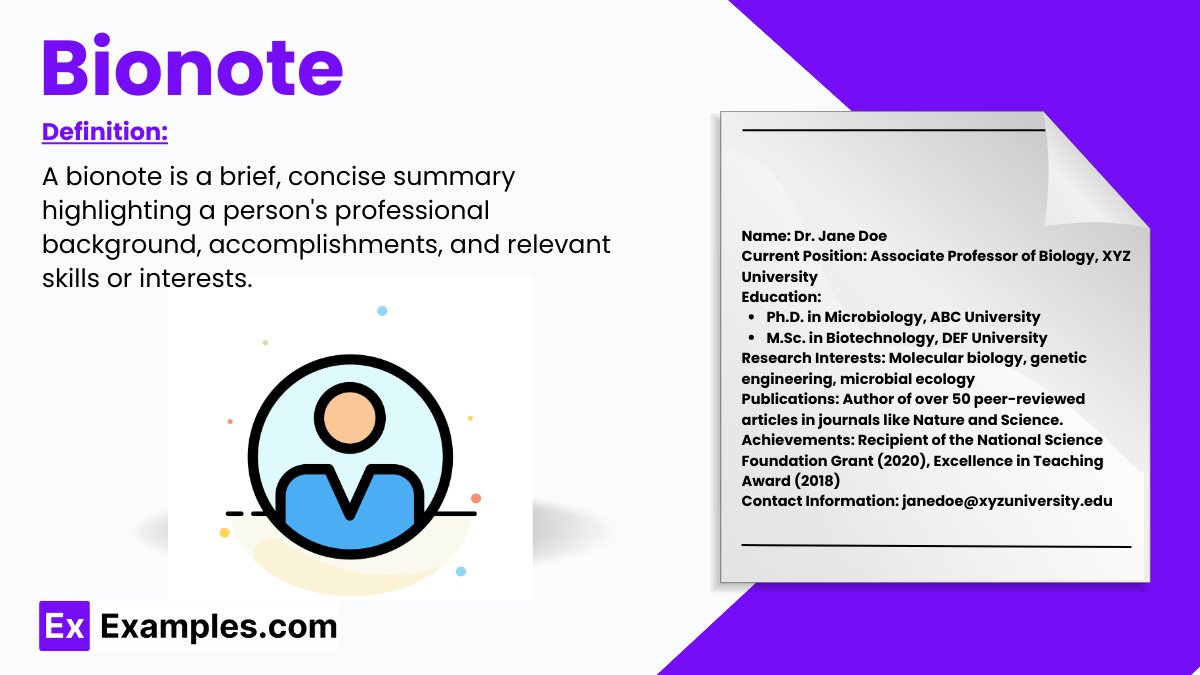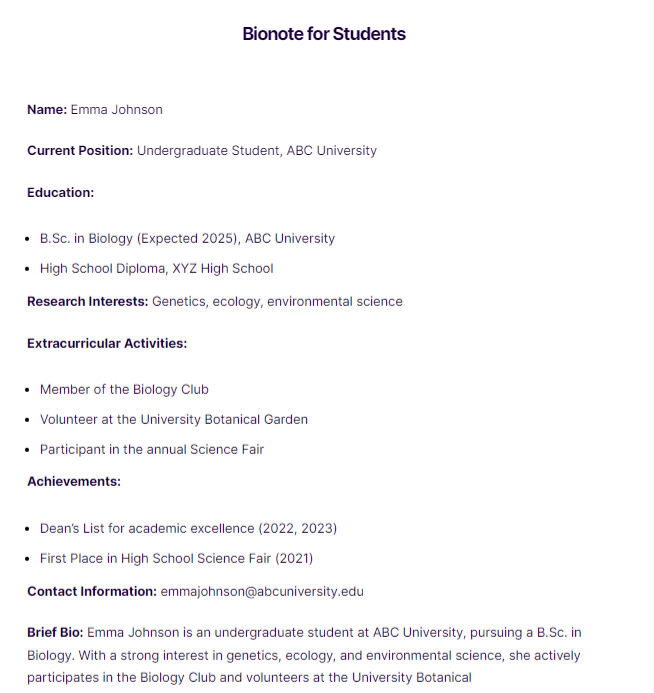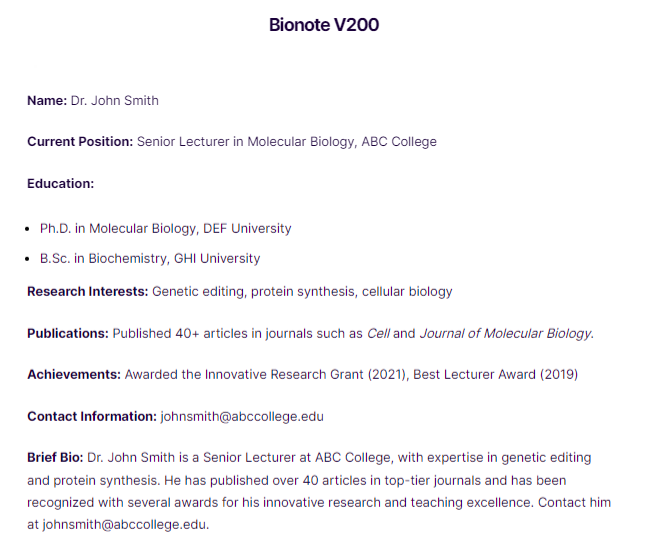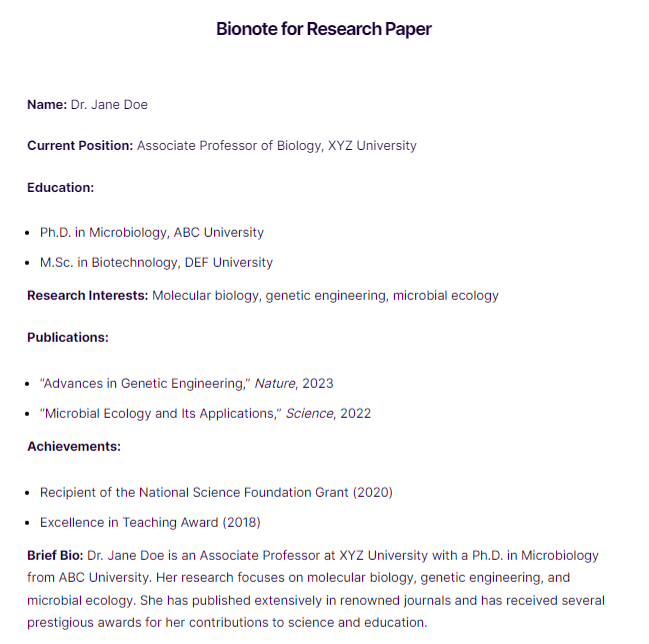What is the primary purpose of a bionote in academic and professional settings?
To summarize a person’s research findings
To present a brief, concise biography
To explain complex biological concepts
To list all professional qualifications


A bionote is a concise summary of a person’s professional and academic achievements. It highlights key experiences, expertise, and contributions in their field. Typically used in academic settings, a short bio provides a quick overview of one’s credentials and areas of specialization. Bionote are essential for introductions in conferences, publications, and professional profiles, allowing others to quickly understand the individual’s background and expertise.
A bionote is a brief summary of an individual’s professional and academic achievements, highlighting key experiences and expertise. Commonly used in academic and professional settings, it provides a quick overview of one’s credentials and specializations for introductions and profiles.
Name: Dr. Jane Doe
Current Position: Associate Professor of Biology, XYZ University
Education:
Research Interests: Molecular biology, genetic engineering, microbial ecology
Publications: Author of over 50 peer-reviewed articles in journals like Nature and Science.
Achievements: Recipient of the National Science Foundation Grant (2020), Excellence in Teaching Award (2018)
Contact Information: janedoe@xyzuniversity.edu
Brief Bio:
Dr. Jane Doe is an Associate Professor at XYZ University, specializing in molecular biology and genetic engineering. She has authored over 50 peer-reviewed articles and received prestigious grants and awards for her contributions to microbiology and biotechnology.
Example 1:
Dr. John Smith is a Professor of Biology at ABC University with a Ph.D. in Molecular Biology. He has published over 30 research papers on genetic engineering and received the Excellence in Research Award.
Example 2:
Jane Doe, M.Sc. in Biotechnology, is a Senior Research Scientist at DEF Labs. She specializes in microbial ecology and has authored several influential articles in top-tier journals.
Example 3:
Dr. Emily White, a Ph.D. in Microbiology from XYZ University, is an Assistant Professor known for her work in virology. She has received numerous teaching awards and grants for her research.
Example 4:
Michael Brown, with a Master’s in Environmental Science, is a leading Ecologist at Green Earth Institute. He focuses on sustainable ecosystems and has published extensively on climate change impacts.
Example 5:
Dr. Sarah Green, a renowned Geneticist with a Ph.D. from LMN University, works at Genome Research Center. Her groundbreaking research in gene therapy has earned her multiple accolades and published works.



Bionote stock refers to a pre-prepared, generic template or collection of sample bio-notes that serve as a reference or starting point for creating personalized bio-notes. These examples provide a standardized format, ensuring key details such as name, position, education, research interests, publications, and achievements are included. Creative bio templates within bionote stock help streamline the process of writing bio-notes by offering structured and concise examples, which can be customized to fit individual needs, adding a unique and personal touch.
Bio Note Veterinary is a concise summary detailing a veterinarian’s professional background and expertise. This personal bio includes essential information such as name, qualifications, areas of specialization, education, notable achievements, and relevant experience. It serves as a quick reference for clients, employers, and colleagues to understand the veterinarian’s credentials and professional focus.
It provides a quick overview of one’s credentials and expertise.
Key details such as name, position, education, research interests, publications, and achievements.
In academic settings, conferences, publications, and professional profiles.
Typically, it should be concise, around 100-150 words.
It is usually written in third person.
A bionote is a brief summary, while a CV is a detailed account of one’s career.
Including contact information is optional but can be useful.
It should be updated regularly to reflect recent achievements and positions.
Generally, it focuses on professional and academic information.
Text prompt
Add Tone
10 Examples of Public speaking
20 Examples of Gas lighting
What is the primary purpose of a bionote in academic and professional settings?
To summarize a person’s research findings
To present a brief, concise biography
To explain complex biological concepts
To list all professional qualifications
Which of the following is commonly included in a bionote?
Detailed life history
Key achievements and professional background
A complete list of publications
A full career tim
How is a bionote different from a full curriculum vitae (CV)?
A bionote is more detailed than a CV
A CV focuses on personal interests, while a bionote focuses on professional aspects
A bionote is shorter and more condensed than a CV
A bionote lists all publications, while a CV does not
What is the ideal length of a bionote for an academic presentation?
One or two sentences
Two to three paragraphs
One to two pages
Five to six pages
In which situation would a bionote most likely be used?
Writing a research paper
Applying for a grant
Introducing a speaker at a conference
Writing a detailed thesis
Which of the following is a key characteristic of a well-written bionote?
It is creative and imaginative
It is concise and focused
It is comprehensive and exhaustive
It is informal and casual
How should you structure a bionote for a professional setting?
Focus on personal hobbies and achievements
Include only academic achievements and qualifications
Provide a balanced overview of both academic and professional achievements
Mention only future career goals
Which of the following should be avoided in a bionote?
Including personal contact details
Mentioning key professional milestones
Including relevant qualifications
Highlighting notable projects
When writing a bionote for a publication, what should be included?
Detailed career history
Relevant expertise and professional achievements
Personal anecdotes
A list of all references
How can a bionote enhance a person’s professional profile?
By showcasing their personal interests
By providing detailed personal background
By highlighting key academic and professional accomplishments
By listing all previous job positions
Before you leave, take our quick quiz to enhance your learning!

